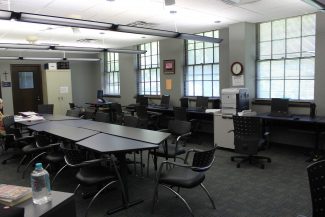Finals week can be hectic without proper preparation. Being proactive is key to ensuring less stress and more success.
The first step must be to find a quiet place devoid of distractions. Procrastination is born from distractions, therefore, distractions can be the No. 1 enemy of the student preparing for finals week. One of the biggest distractions that can be eliminated is the cell phone, which leads to uncounted hours of lost time. Setting phones to “do not disturb” allows for maintaining better focus on other tasks.
Maintaining focus in a quiet environment is easy to find on campus. Obviously, one of the quietest places on campus is the library.

The Dugan library contains a number of private study rooms on the second floor. Another great space is located at the north end of the third floor of Sacred Heart where students will find the “The Hanger” computer lab/study space, which is also connected to the Academic Resource Center. Also, the bottom level of Sacred Heart has a number of quiet areas for studying along with the basement of McNeil which has a couch area that can be used for studying or writing.
When it comes time to study, writing coach and senior Rachel Adducci, says she rewrites key components of previously written notes and further solidifies information by highlighting essential parts. According to a joint study, conducted by professors of Princeton University and the University of California, Los Angeles, taking notes by hand and reframing the information in one’s own words is far more beneficial for memory than taking notes on a laptop or tablet.
Associate Professor of English Susan Crane, Ph.D., suggests connecting with peers who know the examination material well and learning their tactics for studying the material.
Tests are not the only part of finals week. Many lengthy papers are due that week as well. A vital tip to ensuring that a 15-page paper is not written the night before is to plan on writing two pages of the paper per day with a day or two allowing for revisions. This tip is incredibly helpful for ensuring a reduction in stress along with a better written, more cohesive paper.
Writing coaches help students organize their thoughts or fix the formatting and overall flow of the paper. The writing coaches do not work on the week of finals, so Adducci advises rough drafts be sent in as soon as possible so the coaches have plenty of time to give feedback.
There are also tutors for other majors and subjects as well. Learn about all the resource options offered by the Academic Resource Center.
The library is not only a quiet place to study, but it also offers numerous services. Reference and Instruction Librarian Jeanette Parker and Director of Library Services Steve Hamersky have put together 74 “LibGuides” for majors and classes. These LibGuides are an invaluable tool for research. The guides help students find books, articles, primary sources, and also provide keywords to search for other sources. Plus, the guides help with how to cite sources and even contain the assignment details.
Parker recommends that students “set a realistic study schedule to allow time to study for each final, and don’t expect to remember in one cram session information received over the entire semester.”
She also suggests when writing a paper to “plan time to read through books and articles before sitting down to write papers — this will help avoid the temptation to plagiarize and will also help with making sense of and organizing the information for those papers.”
Check out all of the resources the library has to offer, extended library hours for finals week, and schedule an appointment with a librarian.
Preparation is not all work, though it does comprise a majority of it. Taking a break is also important to ensure a successful finals week. It is well known that breaks can help clear the mind and actually increase motivation. For example, if a car does not stop for gas on a road trip, then the journey will not be completed. Refilling the tank with gas allows the vehicle to travel farther.
Not stopping to take breaks does not mean finishing finals week sooner or doing better; it means burning out, which leads to cheapened performance and procrastination. Breaks should be built into study time, which means they will not set back work time.
Another good rule of thumb is to set a timer for 20 minutes to do something fun, or if time has been properly allotted, take a Friday night to enjoy relaxing with friends or family. Try one of these ten ways to de-stress during finals week.
Preparing with this advice and using the many resources the university offers helps ensure finals week will be positive and rewarding and not as daunting as it seems.

